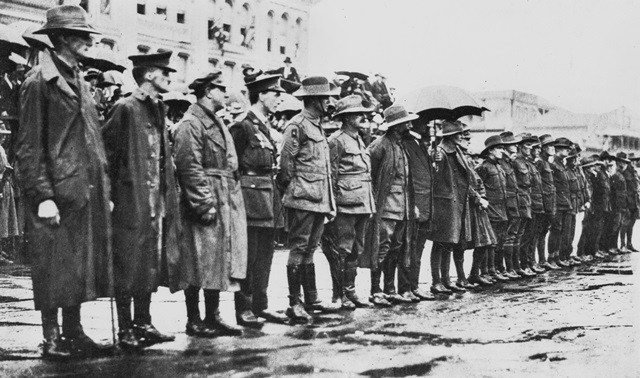There is a deeply false presumption in the memory industry, according to historian and 2015 Q ANZAC 100 Fellow, Dr Neville Buch.
“The presumption is rooted in mistaking the memory of historical enquirer with the memory of the historical person,” he said.
“The connection between the reflections of a later generation and the reflections of an earlier generation provides the clue for a more meaningful investigation.”

Servicemen line up during an Anzac Day procession in Brisbane, 1919. Negative number: 68074. John Oxley Library, State Library of Queensland
During his fellowship year Dr Buch set about examining this connection and ultimately hopes to produce a book that will, in part, explore the diversity of opinion and shifting attitudes of Queenslanders during the war years.
Dr Buch outlines his views on wartime remembrance:
"There are many good books written today around the commemoration of World War I, but the official commemoration and its presence in the media does very little to get to understand the emotions and beliefs which led men off to kill other men, when it became so futile in the end, and achieved very little good, except to reshape the modern world in revulsion to the emotions and beliefs which lead to such carnage – passions and ideas around empires, nation states, trade, and masculinity.
The trouble is that even today we have sections of the population who wish to celebrate those causes, rather than to learn from them.
Even in some elements of the World War I commemoration, too little is said about the contingency of the tragic events, the agency in a person’s decision-making in support or participation for war, and the alternatives in our collective ways of living – which is what war is supposed to protect.
For those who did challenge the emotions and beliefs tied in up in war-making, there was the other challenge of how to find sustainable peace, one which not only avoids conflict but can establish fair adjudication and just outcomes for aggrieved parties. World War II was more centrally the failure of finding that kind of peace from World War I.
Queenslanders did not have primary roles in the decisions that led to war, and to maintain the warfare, then as now. Yet this does not relieve us from a critical examination of our support or participation in war, and how we work for peace.
We also have need, as a matter of honest legacy, to understand our ancestors, those who once shared what we think of as Queensland society."
The call for applications for the 2016 Q ANZAC 100 Fellowship program is now open. Applications will close 31 March 2016. For more information please visit /whats-on/awards/qmawards or email: Fellowships@slq.qld.gov.au or call 3840 7879 or 3842 9823.
Dianne McKean
Comments
Your email address will not be published.
We welcome relevant, respectful comments.